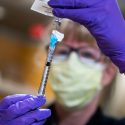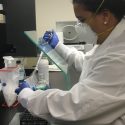COVID questions: Thanksgiving; boosters
Editor’s note: This ongoing series answers questions about COVID-19 and the pandemic. If you have a question to submit, please email it to covid19update@uc.wisc.edu. See answers to previous COVID questions, and visit our COVID-19 impact site.
My child will be getting their first shot of Pfizer before Thanksgiving. Should we feel OK traveling for the holiday, having them around elderly family members or other family members who are unvaccinated?
It’s great to read that your child will be getting vaccinated soon. While the COVID-19 vaccines do reduce the risk of people spreading the virus to others, they do not eliminate that chance, much less just one dose of the Pfizer vaccine. So, taking the proper precautions prior to and during travel and while you gather with family remains very important.
The most significant potential threat to your family members’ health, especially those who are vulnerable to severe COVID-19 illness, is their own vaccination statuses. Anyone unvaccinated, whether or not they are eligible, or not up-to-date on their boosters at the time of gathering, ought to be extra cautious to avoid catching the virus over the Thanksgiving holiday, especially since local transmission rates are expected to remain high for the foreseeable future across much of the country.
—Ajay Sethi, Associate Professor of Population Health Sciences
I received a single shot of Johnson & Johnson six months ago. Can I now receive a booster of Moderna? Is it safe to mix the vaccines?
The Centers for Disease Control and Prevention (CDC) recently updated recommendations for booster shots for some people.
If you received the Johnson & Johnson vaccine, the CDC recommends a booster shot for everyone age 18 and older vaccinated at least two months ago with the Johnson & Johnson vaccine. You may seek any of the COVID-19 vaccines available in the U.S.
If you received the Pfizer or Moderna vaccines, you may receive a booster if you completed your initial vaccine series at least six months ago and are:
- Age 65 and older
- Age 18 or older and have underlying medical conditions that increase your risk of severe COVID-19
- Age 18 or older and live or work in high-risk settings with frequent exposure to SARS-CoV-2, the virus that causes COVID-19
You may “mix and match” which vaccine you receive for your booster dose. For example, if you received the Johnson & Johnson vaccine more than two months ago, you may receive a booster dose of Johnson & Johnson, Pfizer or Moderna. Note that the Moderna vaccine, when given as a booster, is provided in half the dose.
—COVID-19 vaccine information provided by University Health Services
Tags: COVID questions, health



